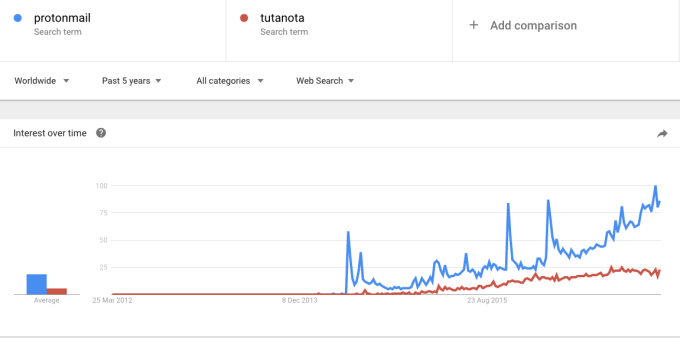Tutanota, an end-to-end encrypted email service located in Germany, says it’s seeing an “exponential” uptick in sign-ups — crediting this to growing awareness of and concern for privacy online for a variety of (often political) reasons.
The freemium, open source encrypted email service exited beta back in March 2015 — with a mission to broaden access to end-to-end encryption vs extant options like PGP that can be too complex for mainstream users to adopt. Tutanota uses RSA and AES encryption, and monetizes via premium tiers — offering paid extras for those who want things like additional storage.
Blogging about a growth trend it says started in the second half of 2016 — but claims has “really taken off recently” — co-founder Matthias Pfau cites data from Alexa Page Rank showing the email service gained around 32,000 page ranks over the past two month, at the same time as other privacy conscious tools, such as the DuckDuckGo private search engine, also saw their rankings rise. So he’s calling 2017 “the start of the privacy-era”.
He’s not attributing Tutanota’s user growth to any single event, such as the election of President Trump in the US, but argues it’s down to a combination of political events and issues which are driving more people to seek privacy-protecting alternatives to safeguard their communications from being parsed by third parties.
“[As well as the election of Trump] also the radicalization of politics in Turkey — and other countries (France, Austria, Netherlands, Brexit & UK surveillance laws) play into it,” he suggests, when asked to what he attributes rising sign-up rates. “As Tutanota is also available in French and Turkish, it is very easy for people there to protect their private communication.”
He tells TechCrunch the email service now has more than 2 million users — which is up from a million a year ago, and around 1.5M at the start of this year. It’s adding more than 200,000 new users per month, he says.
“Growth is highest in the US and in Europe (UK, France, Austria, Germany) and in Turkey. In general Tutanota is growing in all regions,” he adds. “We are excited about this growth because it means people understand the importance of privacy and why it is necessary to protect their private communication.
“We hope this is just the beginning and that the future internet will be much more secure for all of us. That’s also why we plan to add an encrypted address book to Tutanota in the future. Then it will be possible to save one’s contacts encrypted, rather than uploading the entire address book to Google or Apple.”
Last November, another European-based end-to-end encrypted email service — Switzerland-located ProtonMail — also reported seeing an influx of new users. It credited a doubling in the rate of sign ups at the time to the election of US President Donald Trump.
Commenting now, ProtonMail co-founder Andy Yen also suggests a variety of events are contributing to drive interest in pro-privacy services such as end-to-end encrypted email, telling TechCrunch ProtonMail’s current growth rate is “approximately 50% higher compared to the start of the year, and 3x compared to middle of 2016”.
“We have several million users total now, approximately 1 million are monthly active,” he adds.
A Google Trends search comparing ‘protonmail’ and ‘tutanota’ shows interest in both search terms rising, with ProtonMail’s growth curve especially pronounced.
As we suggested last fall, factors such as Trump’s election presents an opportunity for Europe’s privacy startups — especially for those located in jurisdictions with more robust privacy laws (so definitely not in the UK, whose GCHQ intelligence agency has a history of data-sharing with its NSA counterpart in the US). Germany and Switzerland offer more of a legal firewall against the mass surveillance programs revealed by NSA whistleblower Edward Snowden, in 2013.
ProtonMail’s Yen also suggests the usability of strongly encrypted email tech is nearing a tipping point, arguing that privacy-protecting email alternatives are approaching feature parity with mainstream webmail services such as Gmail and Yahoo — which of course do not offer any privacy for users’ comms, given the companies monetize the ‘free’ services via user data and targeted advertising.
And even if a majority of email users are comfortable with Google or Yahoo being privy to their sensitive comms, it’s increasingly obvious that any data any companies have access to is also data that can find its way into the hands of A) hackers and B) government intelligence agencies.
“Politics and events like the US election, Vault7 leaks, Yahoo Mail compromise, etc do tend to create spikes of growth, but the sustained growth comes from approaching feature parity with legacy email providers like Gmail,” argues Yen.
“Effectively, with all else being held equal, given the option between privacy and no privacy, people will tend to pick the private option. Our work today is primarily focused on making sure that all else is in fact equal,” he adds.

